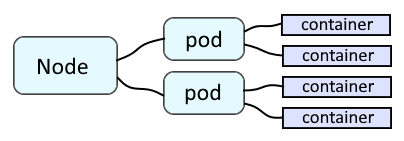
A node (sometimes also referred to as a "machine") contains one or more pods, and each pod contains one or more containers.

Evicting basically means a pod will be terminated and removed from a node.
The oc get nodes command will return the list of nodes.
~]$ oc get nodes
NAME STATUS ROLES AGE VERSION
my-node-edge-lm6wz Ready infra,worker 519d v1.23.5+012e945
my-node-edge-pmlls Ready infra,worker 519d v1.23.5+012e945
my-node-infra-c4v5h Ready infra,worker 519d v1.23.5+012e945
my-node-infra-mc8rc Ready infra,worker 519d v1.23.5+012e945
my-node-infra-p9cjv Ready infra,worker 519d v1.23.5+012e945
my-node-master-0 Ready master 522d v1.23.5+012e945
my-node-master-1 Ready master 522d v1.23.5+012e945
my-node-master-2 Ready master 522d v1.23.5+012e945
my-node-worker-lk5vm Ready compute,worker 61d v1.23.5+012e945
my-node-worker-pj4r4 Ready compute,worker 61d v1.23.5+012e945
The oc adm drain command can be used to evict the pods on the node. In this example, the pods on my-node-worker-lk5vm will be evicted, and the pods should be recreated on one of the other worker node. It's definitely a good idea to include the --dry-run client option to see what this command should do.
~]# oc adm drain my-node-worker-lk5vm --dry-run client
node/my-node-worker-lk5vm cordoned (dry run)
evicting pod my-pod-9mzm2 (dry run)
evicting pod my-pod-vmzmz (dry run)
evicting pod my-pod-pflxc (dry run)
pod/my-pod-9mzm2 evicted (dry run)
pod/my-pod-vmzmz evicted (dry run)
pod/my-pod-pflxc evicted (dry run)
node/my-node-worker-lk5vm drained (dry run)
Let's say you have a deployment / pod that has label app: my-app.
metadata:
labels:
app: my-deployment
The --pod-selector option can be used to only drain pods from the node that match a certain label.
~]$ oc adm drain my-worker-4nd2v --pod-selector='app=my-app' --dry-run=client
node/my-worker-4nd2v cordoned (dry run)
evicting pod my-project/y-pod (dry run)
node/my-worker-4nd2v drained (dry run
I often include the following command line options and flags.
oc adm drain my-node-worker-lk5vm --ignore-daemonsets --delete-emptydir-data --force --grace-period=0 --timeout=180s
Or, the oc adm manage-node command can be used to mark a node as unschedulable. Unlike the oc admin drain node command, the pods will not be evicted from the node. The pods running on the node will continue to remain running on the node.
oc adm manage-node my-node-worker-lk5vm --schedulable=false
After the oc admin drain node command has been issued, the status of the node should include Scheduling Disabled so that no new pods are created on the node. This marks the node as unscheduable.
~]$ oc get nodes
NAME STATUS ROLES AGE VERSION
my-node-edge-lm6wz Ready infra,worker 519d v1.23.5+012e945
my-node-edge-pmlls Ready infra,worker 519d v1.23.5+012e945
my-node-infra-c4v5h Ready infra,worker 519d v1.23.5+012e945
my-node-infra-mc8rc Ready infra,worker 519d v1.23.5+012e945
my-node-infra-p9cjv Ready infra,worker 519d v1.23.5+012e945
my-node-master-0 Ready master 522d v1.23.5+012e945
my-node-master-1 Ready master 522d v1.23.5+012e945
my-node-master-2 Ready master 522d v1.23.5+012e945
my-node-worker-lk5vm Ready compute,worker 61d v1.23.5+012e945
my-node-worker-pj4r4 Ready,SchedulingDisabled compute,worker 61d v1.23.5+012e945
The oc adm uncordon command can be used to mark a node as schedulable so that pods can again be created on the node.
~]$ oc adm uncordon my-node-worker-lk5vm
node/my-node-worker-lk5vm uncordoned
Or, the oc adm manage-node command can be used.
oc adm manage-node my-node-worker-lk5vm --schedulable=true
Did you find this article helpful?
If so, consider buying me a coffee over at 